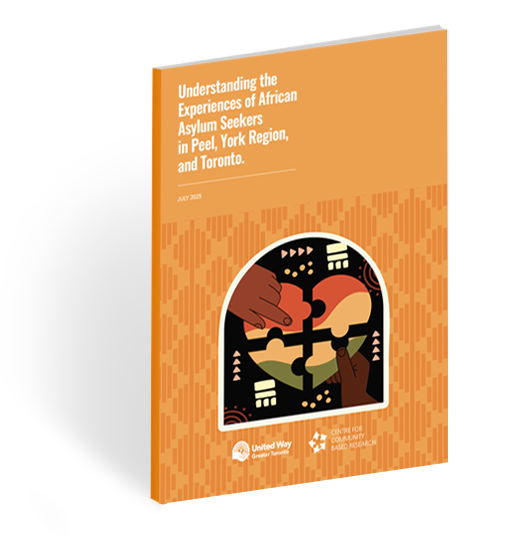July 15, 2025 (Toronto, ON) – A new report from United Way Greater Toronto reveals that African asylum seekers continue to face profound barriers in their resettlement journey — from unaffordable housing and employment discrimination to systemic anti-Black racism and uneven access to basic supports.
Understanding the Experiences of African Asylum Seekers was initiated in response to the 2023 refugee crisis, when hundreds of newly arrived asylum seekers — many from African countries — were forced to sleep on the streets as the shelter system buckled under pressure. Developed in partnership with the City of Toronto, and with support from the Region of Peel, York Region, and an advisory committee of community leaders, the report draws on interviews with 29 African asylum seekers and 9 service providers, offering an unfiltered look at the challenges people face — and the steps we need to take to fix them. “Collaboration is key to tackling the challenges this crisis has exposed. From the frontline to all levels of government, hand in hand with those affected, we need to be working together,” said Nation Cheong, Vice President of Community Impact and Mobilization at United Way Greater Toronto. “This research — shaped by the lived experiences of asylum seekers — is helping us build a coordinated strategy to improve support systems and prevent future crises.”
The findings are impossible to ignore:
- Housing is out of reach. Many asylum seekers struggle to find safe, stable shelter, often facing discrimination or overcrowded conditions.
- Employment pathways are blocked. Foreign credential bias, racism, and restrictions on training access make it difficult to secure work. One participant recounted being told directly by an interviewer that they would not hire a Black person or an African.
- The system is fragmented. People encounter inconsistent information, limited legal aid, and a lack of culturally appropriate services — especially for Black asylum seekers.
- Relocation doesn’t solve the problem. One participant, a 2SLGBTQ+ asylum seeker and mother of three, described moving from Toronto to Cornwall in search of affordable housing, only to face an abrupt shelter closure, a lack of support from the government, and isolation from cultural communities. She eventually returned to Peel. Similar stories emerged from others who relocated to regions like Niagara, only to face racism, legal hurdles, and limited employment, forcing many to return to the GTA.
- Racism is a throughline. Anti-Black racism shows up at every turn: in housing, health care, employment, and service delivery.
However, the report also highlights what is working and where change is possible. It highlights promising practices like wraparound support from Black-led and faith-based organizations, trauma-informed programming, hiring staff with lived experience, and better digital access.
To help guide next steps, the report outlines three key areas for action:
- Strengthen programs and services through centralized resource hubs, peer mentorship, and culturally responsive care.
- Invest in frontline organizations — especially Black-led agencies — to meet urgent needs and build long-term stability.
- Advance policy change to fast-track asylum claims, address systemic racism, and remove barriers to employment — including systemic bias against foreign credentials. The report also calls for the creation of accountability mechanisms such as formal complaint procedures and evaluations, giving asylum seekers a way to report discrimination or service failure and drive improvement.
The report further emphasizes the need for increased advocacy to confront anti-Black racism and push for durable policy reform — ensuring that what happened in 2023 is not repeated.
United Way Greater Toronto is acting on these recommendations with an initial $400,000+ investment in two community-led initiatives: one by CAFCAN Social Services and one by African Community Services of Peel. Together, these projects will support 200 African asylum seekers — helping at least 50 secure stable housing — while improving access to employment and culturally relevant care.
This media release is also available in French
For all media inquiries, please reach out to:
Katrina Manoukarakis
Account Manager
Blue Sky Communications
KManoukarakis@blueskycommunications.com
About United Way: As the largest non-government funder of community services in the GTA, United Way Greater Toronto reinforces a crucial community safety net to support people living in poverty. United Way’s network of agencies and initiatives in neighbourhoods across Peel, Toronto and York Region works to ensure that everyone has access to the programs and services they need to thrive. Mobilizing community support, United Way’s work is rooted in ground-breaking research, strategic leadership, local advocacy and cross-sectoral partnerships committed to building a more equitable region and lasting solutions to the GTA’s greatest challenges.
